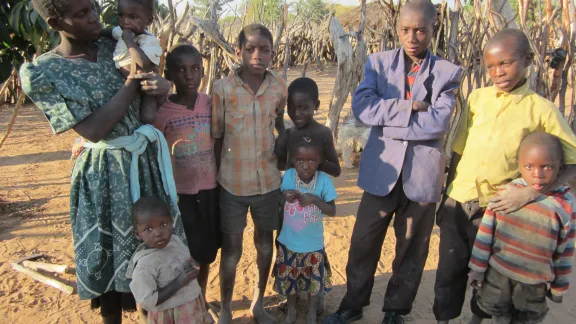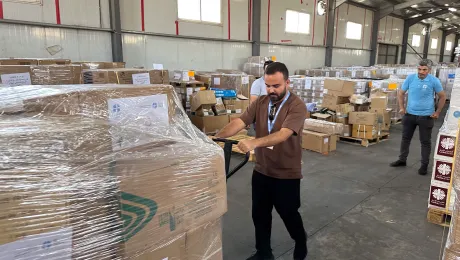
Makalaâs family sells pawpaws to buy food after drought killed their millet crop. © LWF/M. Retief
LWF Reaches Out to Rural Communities in Namibia’s Worst Drought
WINDHOEK, Namibia/GENEVA, 19 September 2013 (LWI) – Makala sits under one of the family’s pawpaw trees in the hot sun, her baby on her lap, and her other children scattered around as she extracts seeds from a pumpkin. Her husband is nowhere to be seen, and when asked, Makala says he is at the local shebeen (bar), one of many in Omusati region, northern Namibia.
Last year the family planted their millet seeds in December, but very little rain came and the seeds did not grow. The only income they get for food is from the pawpaw trees that are still bearing fruit and the pumpkins as they need very little water to grow. However, this is not sufficient to cover the cost of feeding the family members, who would usually eat the millet they had harvested through the hunger months until the next rains.
Makala does not know how she will feed her family for the coming months before the next rain season comes in December— if at all.
She is not alone.
The Lutheran World Federation (LWF) is supporting Namibia’s Lutheran churches to help rural communities cope with the country’s worst drought in 30 years. Out of the more than 700,000 people affected in the population of 2.1 million, over 42 percent of them are categorized as food insecure, according to government estimates.
The President of Namibia has declared a national drought emergency, allocating 20.7 million Namibian dollars to the crisis, and urging help from the international community.
Namibia has one of the highest levels of wealth inequalities in the world. The poverty in rural areas where 1.6 million people reside means that the already vulnerable households relying on livestock and crop production have a difficult time coping with the food and water crisis.
The Namibian government response includes maize distribution and drilling of boreholes but more support is needed. The maize meal does not provide a nutritious diet and there is a high risk of malnourishment among children, 34 percent of who are already living below the poverty line.
On 19 July LWF General Secretary Rev. Martin Junge urged LWF member churches to support those affected by drought in Namibia and Angola with prayers and financial assistance, noting that early signs of malnutrition due to the lack of food and water pointed to a worsening situation.
With assistance from the LWF Department for World Service the United Church Council of Namibia Evangelical Lutheran Churches (UCC-NELC), an emergency response program has been established to provide rural communities with cash to meet the most basic needs in areas where the Evangelical Lutheran Church in the Republic of Namibia (ELCRN) and Evangelical Lutheran Church in Namibia (ELCIN) have congregations. The humanitarian response incorporates capacity building for emergency preparedness and advocacy.
The UCC also includes the German-speaking Evangelical Lutheran Church in Namibia (GELC-ELCIN), which is assisting with the drought response.
Eating Less, Relying on Neighbors and Pensioners
An LWF/UCC rapid assessment mid-June on which the emergency response is based, included visits with local pastors, community and church leaders, the elderly, youth, the unemployed and people with disabilities.
The assessment team found that families are turning to negative coping mechanisms as a means for survival. This includes reducing meals to one a day, relying more on neighbors, sending children to relatives who are able to feed them, and living off pensions received by elderly relatives.
Grazing lands have been severely affected by the drought in six regions of the country, where the majority of households rely on livestock production including cattle, goats, sheep, donkeys and poultry.
Up to 80 percent of households across the country own livestock and 4,000 livestock deaths have been reported.
About 85 percent of farming households say the reason they didn’t plant their crops or planted them late is related to the lack of rainfall. Farming households achieved only 30 percent of their normal harvests. Food stocks dropped drastically with nearly two-thirds of families reporting no food stocks.
Some families, such as Makala’s, plant pumpkins because they require less water, and the seeds can be roasted and eaten along with the pumpkin skin and flesh.
Shortage of Clean Water
Lack of access to clean water and toilet facilities is at a crisis point. Families pay up to 100 Namibian dollars a month for water, and when they run out of money or go into debt and have their water turned off they resort to borrowing from neighbors or relatives.
One family in the north reported it collects five jerry cans of water a day, two for bathing and cooking, and three for the animals. The only way they can afford to continue is that one elderly member of the family receives a government pension.
The LWF assessment noted that with unemployment levels reaching 90 percent in some areas, there is a danger that elderly pensioners, who are willingly helping family members, may be exploited.
Increased Alcohol Consumption
Ms Mairo Retief, LWF/DWS regional emergency coordinator for East and Central Africa, underlined some of the long-term implications of the food shortages, and therefore the need for holistic intervention, which includes psychosocial support.
She cited a group discussion the assessment team had with women in a church in northern Namibia, during which the women explained why alcohol is becoming an alternative in filling their hunger pangs. “‘Would you rather drink a liter of local brew which costs one Namibian dollar or buy a loaf of bread which costs 7.5 dollars to fill your hunger? By drinking the alcohol it also means we have more food to feed our children,’” Retief said, referring to one parent.
The reality is that more and more parents are turning to alcohol both from hunger but also as a result of poverty which leads to stress. There are higher levels of gender-based violence in households as well as neglect and abuse of children, Retief added.
She emphasized the need to strengthen the local response mechanisms which currently includes only the government, churches and the Namibian Red Cross.
Fast and Decisive Help
Rev. Eberhard Hitzler, DWS director, says he is encouraged by the Lutheran communion’s ongoing response to the recent ACT Appeal for the “slowly unfolding disaster in Namibia.” He notes that while only a relatively small number of malnutrition-related deaths have been registered, “it is certain that in the next 12 months there will not be enough food or water for hundreds of thousands of people in several parts of Namibia and Angola.”
At the same time, Hitzler says he is worried that “while larger crises are going on globally, this crisis might be overlooked and largely neglected yet fast and decisive help is needed to avoid a large-scale disaster.”


